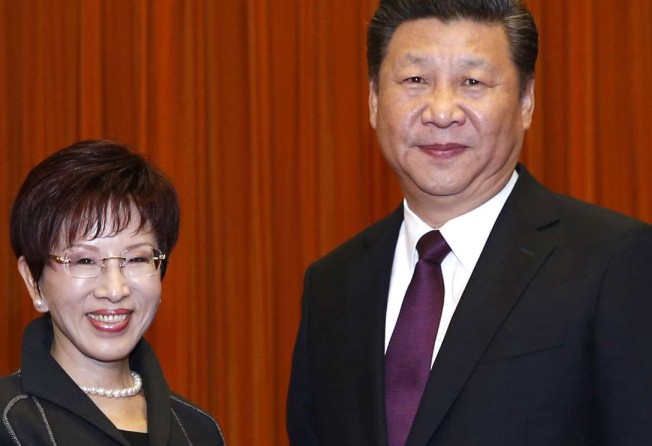
Getting too cosy with Taiwan’s KMT could backfire for Beijing
Island’s opposition should beware making promises without checking with the voting public

Tuesday’s meeting between China’s President Xi Jinping and Taiwan’s Kuomintang chairwoman Hung Hsiu-chu suggested that Beijing would continue to pin its hopes on the island’s main opposition to be its proxy in the fight against Taiwanese independence.
It is the most important interaction across the Taiwan Strait since Xi met then president Ma Ying-jeou in Singapore late last year, in a historic summit which set the tone for future cross-strait relations.
The latest meeting came amid cooling relations with Taiwan’s government. Beijing cut off communication and exchanges with Taipei after the independence-leaning Democratic Progressive Party leader Tsai Ing-wen became president in May.
Economically, Beijing cut off some business exchanges and mainland tourist visits.

Diplomatically, it sought to isolate the island even further by having its representatives barred from international gatherings.
And politically, Beijing wanted to use the high-profile meeting to publicly snub the DPP government, pressuring Tsai to recognise the 1992 consensus, which states there is “one China”, but allows each side to have their own interpretation of “one China”.
Despite being bitter foes during the civil war, the KMT and China’s ruling Communist Party have found common cause in recent years to oppose Taiwan’s independence and embrace closer economic ties.
The KMT also aims to bolster its claim as the only party in Taiwan that can manage cross-strait relations.

The KMT is divided over its China policy. Many say its overreliance on cross-strait relations have cost it dearly, as during the 2014 Sunflower Movement and its landslide defeat in 2016 elections. Some say the Ma-Xi summit helped spark the DPP’s return to power.
Within the party, Hung is seen as the standard-bearer for the party’s more conservative wing. The majority of party centrists and liberals – who’d rather pursue reform and localisation than improve cross-strait relations – might not accept her policy. Some members suspect Hung revised the party platform in order to please Xi, thereby adding weight to her political status, which could help her run for a new term in July.

Many KMT members are unconvinced over the impact of the recent meeting on the party’s standing.
The party’s legislative caucus has openly questioned Hung’s eagerness to meet Xi, especially after she orchestrated the change to the party’s policy platform. On September 4, the KMT national congress adopted a new policy platform that included “deepening” the 1992 consensus and exploring possibilities for signing a peace pact with Beijing.
Taiwanese public and media also generally remain critical of the meeting. They question the legitimacy of Hung as Taiwan’s representative in high-level talks and her claim to seek a peace accord with the mainland, without any authorisation from the ruling government.
Public opinion will be a decisive factor if the KMT is to return to power any time soon. The promotion of any major policy on cross-strait ties must first of all get a public consensus.
Beijing should seriously review its tactics, or its pro-KMT policy will only have the effect of further alienating the main opposition from the Taiwanese public and pushing Taiwan further away from mainland China.
And Beijing should also understand that, under Taiwan’s democratic system, only the elected government is the legitimate representative of the public and authorised to forge any agreements with it on behalf of the Taiwanese people.
Cary Huang, a senior writer with the South China Morning Post, has been a China affairs columnist since the early 1990s